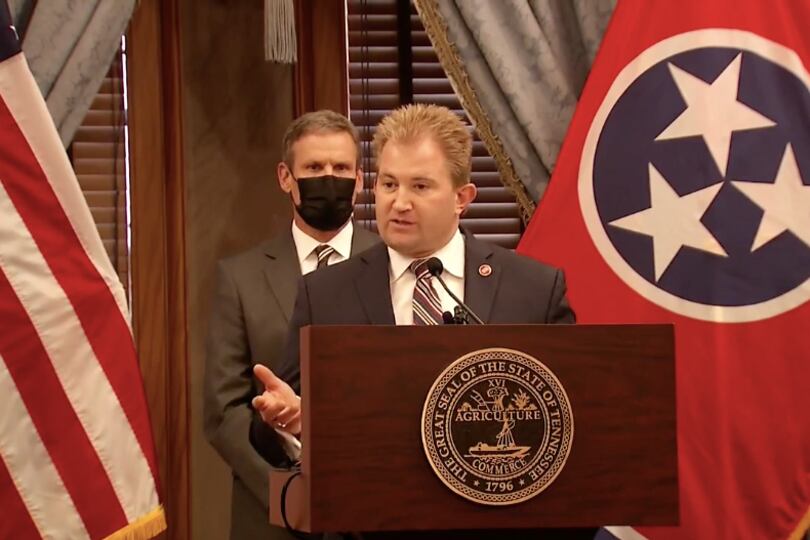Tennessee educators could get a small pay increase for the rest of the school year, even as state lawmakers who voted Friday for the boost acknowledged that many teachers won’t notice a difference in their paychecks.
Concurring with a Senate vote on Thursday, the House unanimously approved $42 million more toward instructional salaries from Jan. 1 through June 30, including $12 million to cover what local governments would normally have to match.
The pay hike equates to a 2% funding increase toward the salaries of teachers and other certified educators like school administrators, counselors, librarians, and social workers.
The move wrapped up the legislature’s four-day special session on education, called by Gov. Bill Lee to address learning disruptions for students during the coronavirus pandemic, plus perennial challenges with teacher pay and literacy. On Thursday, lawmakers voted to strengthen Tennessee’s third-grade retention requirements; create new summer and after-school learning programs; require schools to provide phonics-based reading instruction; and hold teachers, schools, and districts harmless from the results of state tests scheduled for this spring.
“What was accomplished here is remarkable,” the Republican governor said after the GOP-controlled legislature completed its work. The changes, he said, will make Tennessee the nation’s “most aggressive state” to get students back on track.
But Democrats criticized the “rush” to enact sweeping policy changes that will affect students and schools for years. They singled out the governor’s plan to require schools to hold back third graders beginning in 2022-23 if they aren’t considered proficient at reading and don’t take advantage of new programs to improve.
“It is absolutely reckless to change our retention policy in a four-day special session,” said Senate Minority Leader Jeff Yarbro of Nashville. “It’s not something the legislature should rubber stamp without hearing from our educators and the people who are going to be affected.”
Lawmakers did not take up a controversial bill designed to push school districts in Memphis and Nashville to provide in-person learning options during the pandemic. The proposal, introduced earlier this week by GOP leaders, could take away state funding from school systems that stay all virtual.
House Majority Leader William Lamberth said he hopes the bill will pass during the regular session ahead. “It is critical that we get schools back open so that there is an in-person option,” said the Portland Republican.
Earlier Friday, Shelby County Schools Superintendent Joris Ray posted a video message begging lawmakers to reject the bill. “As you’re making decisions on behalf of students in Shelby County, please don’t hurt my children,” said Ray, who insists that remote learning is the right plan for Memphis, where virus spread has been high.
The 2% funding boost toward salaries will more realistically translate into a 1% pay bump by the time the increased allocation moves through the state’s education funding formula known as the Basic Education Program, or BEP.
Because Tennessee districts hire about 10,000 teachers beyond what the formula funds, the increase would get spread across those salaries too, or not at all, if school systems opt to invest in more staff or benefits.
Rep. Patsy Hazlewood, who chairs the House Finance Committee, said getting state dollars into the pockets of teachers is complex, though the intent is to boost teacher pay.
“We can never tell a teacher that they’re going to get a percentage raise,” said the Signal Mountain Republican. “All that we can tell them is that we have allocated funds for X% raise based on the BEP formula. Their local district in their budget will determine how those dollars are actually spent.”
Democrats characterized the increase as paltry and even insulting to teachers who are working longer hours and adapting to changing teaching models during the pandemic. Rep. Gloria Johnson, a retired teacher from Knoxville, compared the increase to a penny tip for a restaurant server.
Others said the challenge spotlights inadequacies in both the state’s funding formula and its level of funding. While it’s invested $1.5 billion more in education over the last decade, Tennessee still ranks near the bottom in spending per pupil. A 5-year-old lawsuit brought by the state’s two largest school districts challenges the adequacy of the state’s education investment and is scheduled to go to trial in October.
The governor has said he plans soon to propose a 4% increase toward teacher pay in next year’s state budget, which would take effect on July 1.
The raise for the rest of this year, while retroactive to Jan. 1, could take some time to process. “Those funds will go to the districts,” Hazlewood said. “I would anticipate that they will not pay the teachers until they get the state dollars.”








